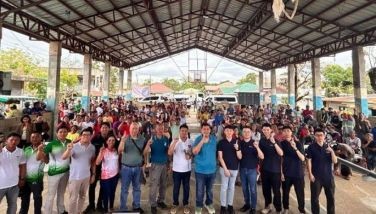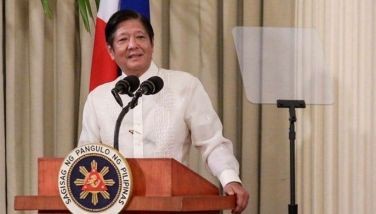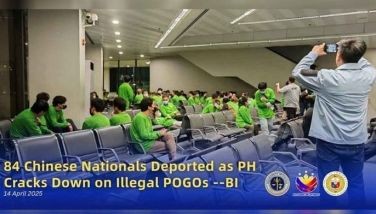Maguindanao sultan shot dead
January 13, 2006 | 12:00am
SULTAN KUDARAT, Maguindanao — A lone gunman killed Maguindanao’s reigning 25th sultan in front of his residence here Wednesday night.
Sultan Amir Baraguir, 46, had just alighted from a car near his frontyard when the man, armed with a caliber .45 automatic, approached and shot him repeatedly in the head.
The man also shot and wounded Baraguir’s younger sibling, Datu Andih, before fleeing on board a motorcycle driven by another man.
Police investigators were still clueless on the motive behind Baraguir’s killing.
SPO4 Dikalingan Masla, Sultan Kudarat police chief, expressed suspicion that the gunman could be a hired killer since he used a caliber .45 automatic which Masla described as a "traditional signature firearm" of a gun-for-hire.
Baraguir was known in Central Mindanao as a friendly datu, a prolific writer and a staunch advocate of the preservation of Moro culture and traditions.
Baraguir was also popular for his teachings, through his columns in the Mindanao Cross, a weekly newspaper here of the Oblates of Mary Immaculate congregation, on traditional means of resolving conflicts besetting Moro communities.
Baraguir was also generous in providing his friends in the media with various references for features on the Islamic religion, the Moro royalty, and the quest of Filipino-Muslims for self-governance.
Baraguir was installed as the 25th sultan of Maguindanao by his elder-benefactors from the Zamboanga Peninsula, Central Mindanao and the South Cotabato-Sultan Kudarat-Sarangani-General Santos City (Socsksargen) area only last December.
The closely related Baraguir and Mastura clans in this town are descendants of the legendary Sultan Kudarat, a 17th century Moro warrior and a great grandson of Shariff Mohammad Kabungsuwan, an Arab-Malay preacher from Johore who arrived in mainland Mindanao 700 years ago and introduced Islam.
"It is so sad that he died such a tragic death. He would have been a good instrument for cultural and religious solidarity among Mindanao’s culturally diverse people," said Cotabato City Mayor Datu Muslimin Sema, a relative of Baraguir.
The Grand Royal Sultanate of Talik, which dates back to the 18th century, condemned Baraguir’s killing, saying it was "a direct attack on the Sultanate of Maguindanao."
The Sultanate of Talik covers the provinces of South Cotabato, Sultan Kudarat and Sarangani and the cities of Tacurong, Koronadal and General Santos.
The gunslaying, Paramount Sultan Datu Nasser Sambuto Pendatun told The STAR in a cellphone interview, was a "crime against all the sultanates in Mindanao."
"We lost a good ally in promoting peace in our respective sultanates. We mourn his untimely death," he said.
In a common statement, the four district sultans of the Sultanate of Talik denounced the killing as a "barbaric act" and called on the police to do their best in solving it.
The four district sultans are Datu Ambas Cartil of Koronadal, Datu Omar Sambuto of Koronadal Valley, Datu Mustapha Akmad of Koronadal-Sipadan (West), and Datu Asgar Mangelen of Koronadal-Sebangan (West).
Baraguir is survived by his two wives, Bai Mo’minah and Bai Zainab, and seven children. — With Ramil Bajo
Sultan Amir Baraguir, 46, had just alighted from a car near his frontyard when the man, armed with a caliber .45 automatic, approached and shot him repeatedly in the head.
The man also shot and wounded Baraguir’s younger sibling, Datu Andih, before fleeing on board a motorcycle driven by another man.
Police investigators were still clueless on the motive behind Baraguir’s killing.
SPO4 Dikalingan Masla, Sultan Kudarat police chief, expressed suspicion that the gunman could be a hired killer since he used a caliber .45 automatic which Masla described as a "traditional signature firearm" of a gun-for-hire.
Baraguir was known in Central Mindanao as a friendly datu, a prolific writer and a staunch advocate of the preservation of Moro culture and traditions.
Baraguir was also popular for his teachings, through his columns in the Mindanao Cross, a weekly newspaper here of the Oblates of Mary Immaculate congregation, on traditional means of resolving conflicts besetting Moro communities.
Baraguir was also generous in providing his friends in the media with various references for features on the Islamic religion, the Moro royalty, and the quest of Filipino-Muslims for self-governance.
Baraguir was installed as the 25th sultan of Maguindanao by his elder-benefactors from the Zamboanga Peninsula, Central Mindanao and the South Cotabato-Sultan Kudarat-Sarangani-General Santos City (Socsksargen) area only last December.
The closely related Baraguir and Mastura clans in this town are descendants of the legendary Sultan Kudarat, a 17th century Moro warrior and a great grandson of Shariff Mohammad Kabungsuwan, an Arab-Malay preacher from Johore who arrived in mainland Mindanao 700 years ago and introduced Islam.
"It is so sad that he died such a tragic death. He would have been a good instrument for cultural and religious solidarity among Mindanao’s culturally diverse people," said Cotabato City Mayor Datu Muslimin Sema, a relative of Baraguir.
The Grand Royal Sultanate of Talik, which dates back to the 18th century, condemned Baraguir’s killing, saying it was "a direct attack on the Sultanate of Maguindanao."
The Sultanate of Talik covers the provinces of South Cotabato, Sultan Kudarat and Sarangani and the cities of Tacurong, Koronadal and General Santos.
The gunslaying, Paramount Sultan Datu Nasser Sambuto Pendatun told The STAR in a cellphone interview, was a "crime against all the sultanates in Mindanao."
"We lost a good ally in promoting peace in our respective sultanates. We mourn his untimely death," he said.
In a common statement, the four district sultans of the Sultanate of Talik denounced the killing as a "barbaric act" and called on the police to do their best in solving it.
The four district sultans are Datu Ambas Cartil of Koronadal, Datu Omar Sambuto of Koronadal Valley, Datu Mustapha Akmad of Koronadal-Sipadan (West), and Datu Asgar Mangelen of Koronadal-Sebangan (West).
Baraguir is survived by his two wives, Bai Mo’minah and Bai Zainab, and seven children. — With Ramil Bajo
BrandSpace Articles
<
>
- Latest
- Trending
Trending
Latest
Trending
Latest
Recommended



























